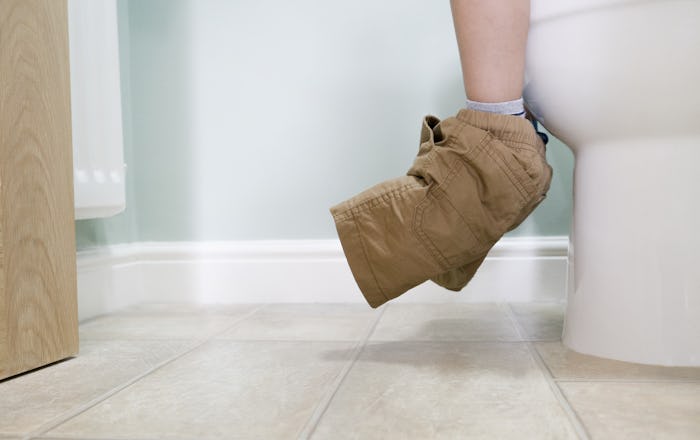Life

Potty Training & What We Miss When We Talk About It
You've probably seen countless articles, books, Youtube tutorials on how to potty train, but it's likely that none of those resources, in offering guidelines on how and when to go about it, considered potty training children with disabilities. In fact, the popular discourse around parenting often erases or ignores narratives about what it's like to navigate parenthood while also navigating issues related to disabilities.
As defined by the Americans with Disabilities Act, a person with a disability is someone who "has a physical or mental impairment that substantially limits one or more major life activity." This can include mental illnesses and a "wide range of conditions related to emotional and mental health." When it comes to children with disabilities, who are tackling milestones with their caregivers, traditional or standard guidelines regarding child development aren't always applicable. Sometimes, they can even lead to stress for the parents.
Dr. Tamara R. Mose, Ph.D., a professor of sociology at Brooklyn College, tells Romper that navigating some of these moments can be physically, emotionally, mentally exhausting, for both the child and the parent. "People with disabilities tend to not just have the disability itself, but generally some health conditions, or health complications, attached to [the disability]," she tells Romper.
When describing what it's like to potty train her child, who has Down syndrome and accompanying kidney problems, Mose says that she has to exercise a new type of patience. "Health complications can make potty training take a little longer, so we can’t really look at standard timetables."
Some children with disabilities may "have a high activity level, be anxious in new situations, have difficulty feeling when they need to go, or have sensory sensitivities," according to research at the Vanderbilt Kennedy Center, so it's important to take those factors into account when thinking about potty training. It's easy to compare our situations with others — especially when parents often share milestones on social media — but keep in mind that there are countless factors that impact developmental milestones that go beyond factors like age and gender.
Mindy Scheier, philanthropist and disability activist, wrote in a February 2017 piece for HuffPost, that "there is no handbook on how to parent a child with a disability, how to parent siblings of a child with disability, or how to parent a soon-to-be adult with a disability." She went on to emphasize the importance of doing your best and accepting that mistakes will be made along the way as parents.
There may not be anyone else with the same constellation of symptoms as your child, but there are people with similar challenges. Find those people.
This is important advice given the findings of a study done by Dr. Elizabeth Mazur, Ph.D., an expert in developmental psychology, that revealed that parents of children with mental illness face many concerns including, but not limited to, "the effects of children's illness on themselves, specifically feelings of helplessness, their need for advice on their own coping, and the stress of child discipline."
Some parents, caregivers, and experts take to social media to connect with others navigating potty training with children with disabilities.
"Because of developmental delays, the cognitive concept of potty training sometimes does not make sense," Mose tells me. As a result, the process of potty training can take even longer. "Until ages 4 to 7," Mose adds, speaking from her own experiences.
Dr. Darla Clayton, Psy.D., a psychologist and founder of Strong as Steel Adaptive Sports, a platform that offers sport-specific training and opportunities for children with physical disabilities and visual impairments, wrote for the website Abilities.com that she knows "how hard it is to hear from parents that their child six months younger than yours is walking and yours isn’t. Or dealing with the well-meaning stranger who asks why your 2-year-old is scooting around on their butt rather than being up on their feet." In her article, she encouraged parents not to let others get them down. "There may not be anyone else with the same constellation of symptoms as your child, but there are people with similar challenges. Find those people."
In the meantime, know that you're not alone if you're navigating developmental milestones with a child with a disability. If you're not parenting a child with a disability, be mindful of assumptions you make or opinions you have about other family's experiences with potty training.
This article was originally published on